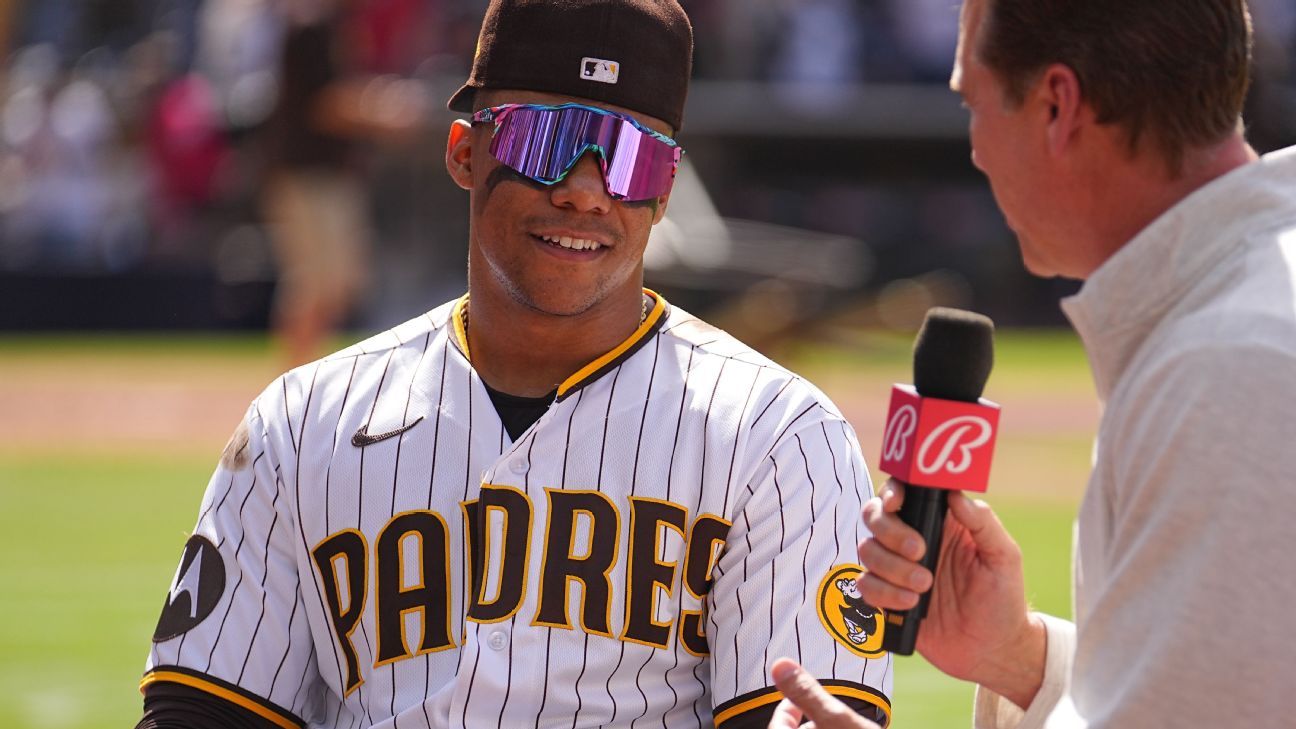How can you watch the Padres? What you need to know about MLB’s TV takeover

Alden Gonzalez, ESPN Staff WriterMay 31, 2023, 01:36 PM ET
It took a little longer than Major League Baseball might have anticipated, but the San Diego Padres, fielding one of the most expensive, star-laden rosters in the industry, have become the first team to fold into its long-term plan of fitting all broadcasting rights under a national umbrella.
Diamond Sports Group, the Sinclair subsidiary navigating through bankruptcy proceedings, let a grace period come and go on Tuesday without paying the Padres, allowing the team to break free from its contract.
Through a statement, a Diamond spokesperson said “the economics of the Padres’ contract were not aligned with market realities.” And so, beginning today and continuing on in perpetuity, MLB will take over the Padres’ local broadcasts. It’s a major transition, but fans are not expected to miss any games; they’ll be available through the league’s MLB.tv app, initially for free, and through various cable companies on a different channel. MLB had been anticipating something like this for months.
“I think the whole thing’s unfortunate,” MLB chief revenue officer Noah Garden told ESPN. “Since Day 1, we had hoped that our partners lived up to their contractual obligations. And through a variety of, quite frankly, mismanagement and continued mismanagement, their company fell on hard times.
“We’ve been forced to take a step back and find a way that we can continue to service the fans — and we’re going to do so, as it’s the lifeblood of our industry and so important to our fans, especially locally. We’re gonna invest in the product; we’re gonna make it better than ever; we’re gonna distribute it more widely than it’s ever been distributed; and we’re gonna stand behind our content. That’s our goal.”
The mechanisms of that approach are highly complex, but a lot of the details were sorted out on the front end, given Diamond’s publicly tenuous financial situation. Here are the answers to some of the most pertinent questions.
From Wednesday to Sunday, Padres games will be free for all fans on MLB.com and Padres.com — two road games against the Miami Marlins and three home games against the Chicago Cubs. All that will be required is an MLB.com login. Starting next Monday, a subscription cost will kick in for Padres streams in the local market.
In-market fans can pay $19.99 a month or $74.99 for the rest of the season to watch San Diego’s games on MLB.tv. But most local fans with cable subscriptions won’t have to.
MLB cut deals with several cable companies — DirecTV, AT&T U-verse, Cox and Spectrum — to air Padres games through their services. Those will be available on different channels (694-3 for DirecTV, 781 for AT&T U-verse, 4 for Cox, 305 for Spectrum). Fans’ guides will list the channel simply as “San Diego Padres.”
MLB essentially eliminated territorial rights through those deals, which means that, for local fans who purchase the Padres MLB.tv package, streamed San Diego games will no longer be subject to blackouts. Yep, that’s right — no blackouts.
In the Padres’ situation, not many. San Diego’s in-game, on-air talent is employed by the team (the dynamic is different with other clubs), which means fans will continue to watch play-by-play announcer Don Orsillo, analyst Mark Grant and on-field reporter Bob Scanlan. The makeup of the team’s pregame and postgame shows, however, is still being ironed out, according to a source with knowledge of the situation. Microphone flags will have the MLB logo rather than the red Bally Sports one. Garden said fans will immediately notice more camera angles and a picture quality that is “significantly higher.”
San Diego began this season with a near-$250 million payroll that stood as the third-highest in the sport, the largest in franchise history — by a wide margin — and more than 3½ times larger than it was just six years ago. Now suddenly its financial future is uncertain, at least concerning its profits off broadcasting rights. Only one of three payments for an RSN contract that reportedly pays the team in the neighborhood of $50 million a year was ultimately made by Diamond.
That said, the Padres will still generate broadcast revenue through the deals MLB cut with the various cable companies in preparation for this possibility. Those deals, details of which have not been made public, probably aren’t close to what San Diego was generating through Diamond (particularly because streaming rights weren’t included in them). But the league believes teams eventually will benefit from broadcasting rights and subscription revenue operating through a national model. (Big-market teams such as the New York Yankees and the Boston Red Sox, who own their RSNs, disagree.)
Well, today could be a big day. A hearing will take place in Houston, during which a bankruptcy judge will preside over Diamond’s claims that it should pay lesser rights fees to the Minnesota Twins, Texas Rangers, Arizona Diamondbacks and Cleveland Guardians to account for market forces that have greatly diminished the traditional cable model in recent years.
Those teams are essentially on the bubble. And the judge’s ruling, which is expected no later than Thursday night, will play a big role in Diamond determining which contracts it keeps or sheds as part of the bankruptcy process, not just with those four teams but potentially with some of the other nine that remain under its ownership. MLB commissioner Rob Manfred is among those who will testify.
Other teams that fall out will follow a similar path to the Padres, with MLB offering their games blackout-free on MLB.tv and on various cable channels.